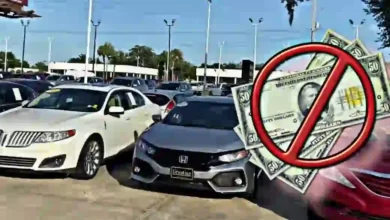Is Flipping Cars Illegal? How Many to Sell a Year?
Is flipping cars illegal? While it is possible to purchase a damaged car on Craigslist for a low price, repair it, and sell it for a profit, this process is now deemed illegal and heavily regulated. In Ohio, for example, the regulations require a hefty financial statement and signage, making it nearly impossible for the average person to become a dealer. As a result, what may have seemed like a promising and legitimate method of making money is now out of reach for many aspiring entrepreneurs.
Nevertheless, don’t let these challenges discourage you! With the right guidance, you can navigate complex regulations, obtain the necessary permits, and start your business today.
Is flipping cars illegal?

Flipping cars is legal, but there are restrictions regarding the number of used cars you can flip or resell within a given year without obtaining a dealership license.
1. Limit your car sales to five or fewer per year
Selling five or fewer cars a year is often considered legal when it comes to flipping cars. However, it’s important to research the laws and regulations in your area to ensure that you comply with all relevant statutes.
For example, In Ohio, there is a specific law that limits individuals from selling more than five cars per year without obtaining a dealer’s license. This law was put in place to protect consumers from unscrupulous individuals who may try to take advantage of them by selling cars without proper documentation or without disclosing known defects.
2. Don’t sign the title yourself
One way to conceal the number of cars you sell is by refraining from signing the title during the purchase and retaining the previous owner’s signature on the title during the sale. This way, it would appear as though you never owned the car, and it would be challenging for anyone or even the state to determine the actual number of cars you have sold.
However, this is known as curb stoning and is illegal, which makes flipping cars illegal.
Note: Car flippers often go undetected by authorities by avoiding registering the car in their name.
3. Consider selling the cars as parts
Instead of fixing them up for resale, sell them as part-outs. It can be profitable but not the best in terms of finding buyers in need of specific parts. Anyways, that’s why you need to list them everywhere, like Craigslist.
Purchasing cars for a few hundred dollars often means that they require a significant amount of work to be roadworthy. It’s not as simple as replacing a battery and brake pads; in most cases, you’ll have to deal with serious issues and try to find cheap parts. Therefore, the real money is in part-outs, not flipping cars. Additionally, there are no legal requirements for part-outs.
4. Sell through a small car dealer
It may result in additional expenses but may be worth it.
Find a small dealer and sell through them, although the legalities may differ depending on your location. An example of a successful small car dealer who operated out of their home in Oregon can serve as inspiration for your plan. This dealer was able to sell cars at an increased price of $150 to cover their expenses, which is similar to what you want to do.
By keeping their overhead costs low and operating out of their home, this dealer was able to offer competitive pricing to their customers while still turning a profit. They also provided a more personalized and convenient experience for their buyers by allowing them to view the cars in a comfortable, low-pressure environment.
5. Make cars available for sale during the income tax return season
If you’re willing to endure the stress of becoming a car dealer, it’s wise to have at least three or four cars priced under $10,000 ready to sell around income tax return season. This is when people who earn a good income tend to have available cash and also struggle to save.
6. Focus on selling Japanese or other desirable brands
Don’t invest in German or luxury brands which can lose value quickly and be expensive to repair.
It may be more advantageous to focus on selling Japanese or other desirable brands rather than German or luxury brands. This is because the former tend to hold their value better over time and may be less expensive to repair, which can be a significant selling point for potential customers. Additionally, Japanese brands in particular are often associated with reliability and longevity, which can further increase their appeal to buyers.
Note: Be wary of potential customers from Arab or Indian backgrounds as they tend to take up a lot of time before making a purchase.
Legal considerations
Here are some important legal considerations to keep in mind when flipping cars:
Licensing and registration
In many states, you may need a dealer’s license before you can venture into the business of making flipping cars illegal. This license is necessary if you sell a certain number of cars annually or if you sell cars with the intention of making a profit. The requirements for obtaining a dealer’s license vary by state but typically involve completing an application, paying a fee, and meeting certain criteria, such as having a physical business location.
You will also need to register the cars you buy with cash and sell, which involves providing proof of ownership and insurance and paying any applicable fees.
Obtaining a clean title
It is also essential to obtain a clean title when purchasing a car. This title verifies that the seller owns the car and that there are no liens or outstanding loans on it. Let us assume you were not able to obtain a clean title, it can automatically lead to legal problems when attempting to sell the car.
Lemon laws
Lemon laws vary by state and are designed to protect buyers who purchase faulty cars. These laws typically require dealers or manufacturers to replace or repair defective cars or provide a refund. Supposing you sell a faulty car and the buyer discovers the fault. You could be held liable for any damages, making flipping cars illegal.
Sales tax
Assuming you flip cars, you may also be required to collect and remit sales tax. The specific requirements for collecting and remitting sales tax vary by state, but generally, if you sell a certain number of cars annually, you’ll be obligated to collect and remit sales tax.
Insurance
To be involved in this business legitimately, you’ll also need insurance coverage for the cars you purchase and sell. You’ll need liability insurance to cover any accidents that may occur during test drives, and you may need garage liability insurance if you store cars at a location other than your home.
Advertising and marketing
When advertising and marketing the cars you’re flipping, it’s essential to provide accurate information about the car’s condition, mileage, and any improvements or repairs you’ve made.
If you make false or misleading statements, it can leave you open to legal action and financial damages.
Actions that could lead to potential legal issues
Flipping cars can be a lucrative business, but it is not without legal risks and challenges. Supposing you are wondering if flipping cars is illegal, then it is important to know certain actions that could potentially lead to legal issues.
1. Fraudulent activities
One of the most common issues associated with flipping cars illegally is fraud. This includes misrepresenting the car’s condition, falsifying documents, or failing to disclose any damages or accidents the car has been involved in. These actions could result in legal issues, potential lawsuits, harm to your business reputation, and financial losses. The by-product makes flipping cars illegal.
2. Title and registration issues
Another common issue related to flipping cars illegally is the title and registration problems. When you fail to be cautious after buying a car, it can lead to a car with a lien or still being registered to another person. These issues can result in legal disputes, challenges, and significant costs in time and money.
3. Selling cars without a dealer’s license
Selling cars without a dealer’s license is yet another legal issue that can arise when flipping cars illegally. The laws of each state vary, but you may require a dealer’s license to legally sell cars. When you fail to obtain one, it could result in legal repercussions and hefty fines.
4. Violation of Lemon Laws
Lemon laws are enacted to protect consumers from defective cars. Selling a car with major mechanical issues could violate lemon laws in your state, resulting in legal consequences, including fines and a potential lawsuit.
However, in Texas, like in all states, for example, lon law does it cover defects that do not substantially impair the use or market value of the vehicle such as minor rattles, radio static, etc.
5. Selling stolen cars
Selling stolen cars is a significant legal issue when flipping cars. When you buy a stolen car, it could result in charges of receiving stolen property, which can have serious legal consequences.
6. Failure to disclose damages
It is important to disclose any damages or accidents the car has been involved in when flipping cars. If you do not disclose damages, then you are indirectly into flipping cars illegally. These legal issues include potential lawsuits from buyers who discover damages after purchasing the car.
7. Violation of environmental laws
Improper disposal of cars can lead to environmental hazards, which is a significant legal issue for car flippers. As a car flipper, it is your responsibility to ensure that the car is disposed of properly and in compliance with environmental laws. If you do not perform this task, then you are indirectly flipping cars illegally.
Conclusion – flipping cars illegal
In general terms, the act of flipping cars is not illegal or inherently unlawful. Nonetheless, you can face legal issues if you engage in certain actions and procedures while flipping cars. Hence, car flippers must comprehend and follow the laws and guidelines in their state and maintain ethical business conduct. Such measures can enable car flippers to operate a lawful and lucrative business venture without facing any legal repercussions.
- 10 Common Mistakes When Bleeding Brakes - September 12, 2023
- Dash Cam That Records When Car is Off [5 Best] - September 11, 2023
- How to Know if Dash Cam is Recording [10 Methods] - September 8, 2023




